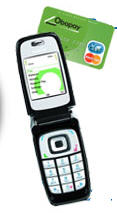 In today's WSJ, there's a good roundup of the text-message payment systems attempting to find traction in the United States. The article looks briefly at TextPayMe, Obopay, and PayPal Mobile. The article does a good job of contrasting these systems to the more common "mobile wallet" where a cellphone is used in place of a credit/debit card.
In today's WSJ, there's a good roundup of the text-message payment systems attempting to find traction in the United States. The article looks briefly at TextPayMe, Obopay, and PayPal Mobile. The article does a good job of contrasting these systems to the more common "mobile wallet" where a cellphone is used in place of a credit/debit card.
Analysis
We see much promise for the latter. In fact, it's almost inevitable that today's plastic-based payments systems morph into cellphone-based services using radio frequency (RFID) technology as the enabler. For many people, especially younger cellphone-toting debit card users, it will be easier to point their phone at the POS terminal and press # than to swipe a card and enter a PIN or sign a receipt. Arthur D. Little projects $37 billion in mobile wallet transactions in 2008, a twelve-fold increase from the $3 billion in 2003.
However, text-message-based services, designed to send money to individuals, are a solution seeking a problem. Even the WSJ couldn't dig out a rational anecdotal example, though the writer tried. The "splitting the dinner bill" straw man was trotted out, but it just doesn't fly. Imagine you had a group splitting a $100-tab four ways. The vendors want us to believe that one person will pay the entire bill, then his or her three friends will each text-message their $25 share.
Not only is this a hassle (what if the phone call is disconnected, or the wrong button is pushed in a dark eatery), but each of the three parties will likely incur one or more transaction fees (from the payments gateway, the cellphone provider, and possibly one or more financial institutions along the way). Finally, the person receiving those payments then has to initiate some type of transaction to tap the $75 sitting in their cell phone.
This makes about as much sense as ordering dog food online. Current methods of sharing costs, either with cash, having the restaurant apply it to two or more debit/credit cards, or by agreeing to "get the next one" works just fine.
Mobile Wallets Obopay and PayPal both offer a linked debit card for spending the money sitting in your payments account. But it's not as powerful as a true mobile wallet where the bank offers its debit card base a cell phone preprogrammed to link customers to their card and online banking account. The device could be used to check bank account balances (a walking ATM), transfer money between the user's own accounts, or send money to others using the bank's bill pay system or inter-institution funds transfer (A2A); and, if equipped with RFID, the device can be used to pay for purchases at the point of sale.
Obopay and PayPal both offer a linked debit card for spending the money sitting in your payments account. But it's not as powerful as a true mobile wallet where the bank offers its debit card base a cell phone preprogrammed to link customers to their card and online banking account. The device could be used to check bank account balances (a walking ATM), transfer money between the user's own accounts, or send money to others using the bank's bill pay system or inter-institution funds transfer (A2A); and, if equipped with RFID, the device can be used to pay for purchases at the point of sale.
The bank-based mobile wallets have significant advantages over the start-up, non-financial systems:
1. Trust
2. Integrated online banking features (balance lookup, transaction history)
3. Integrated bill payment (use pre-existing bill pay merchants)
4. Mobile payment transaction history integrated with online banking history
As cool as the mobile wallet sounds, it will not replace cash or plastic until RFID-equipped POS terminals are widespread. Until then, you'll still need to carry plastic. That brings to mind a practical interim solution, a plastic clip that attaches an RFID-enabled mini-credit card to the back of a cell phone. Users would have the convenience of waving their cell phone to pay, but could also easily swipe the mag stripe through a conventional terminal.
—JB